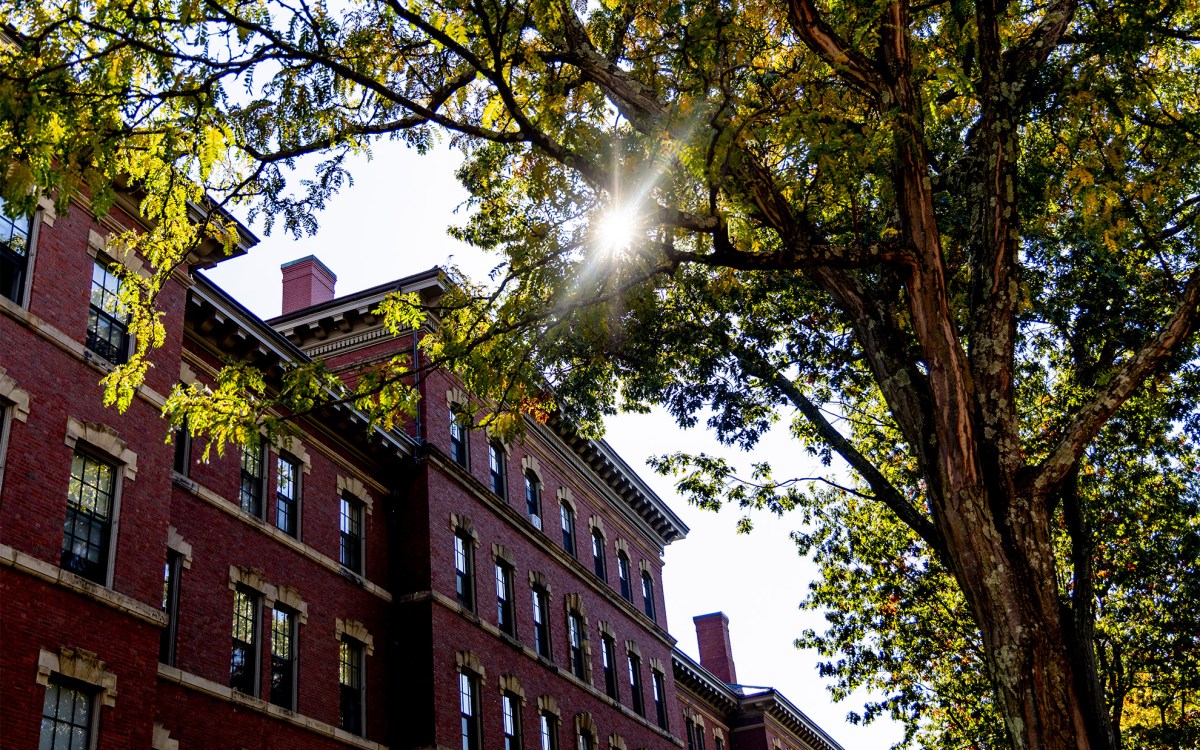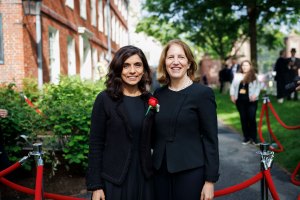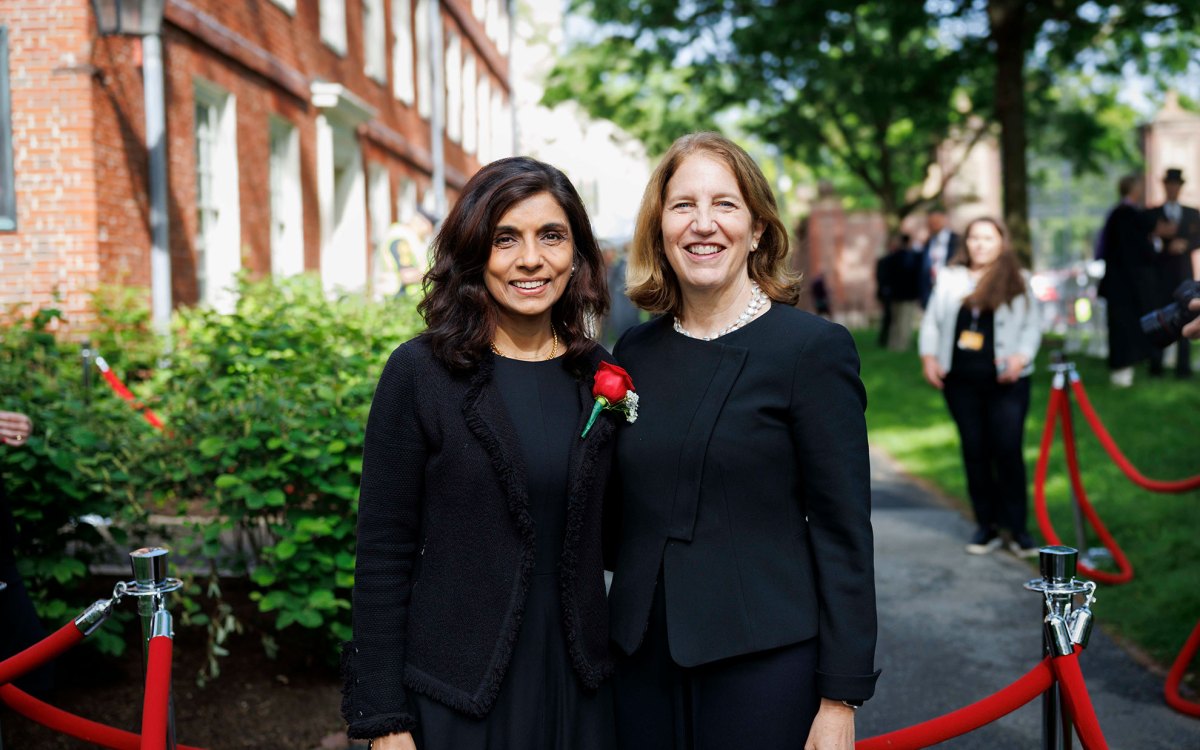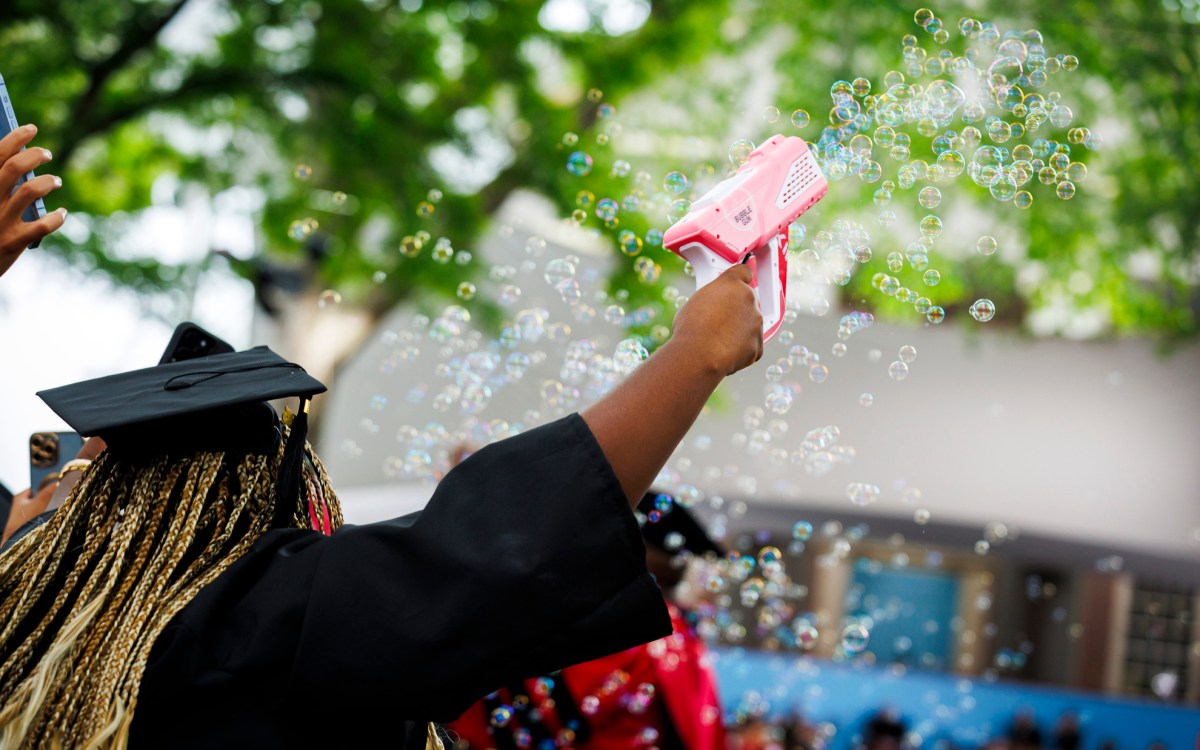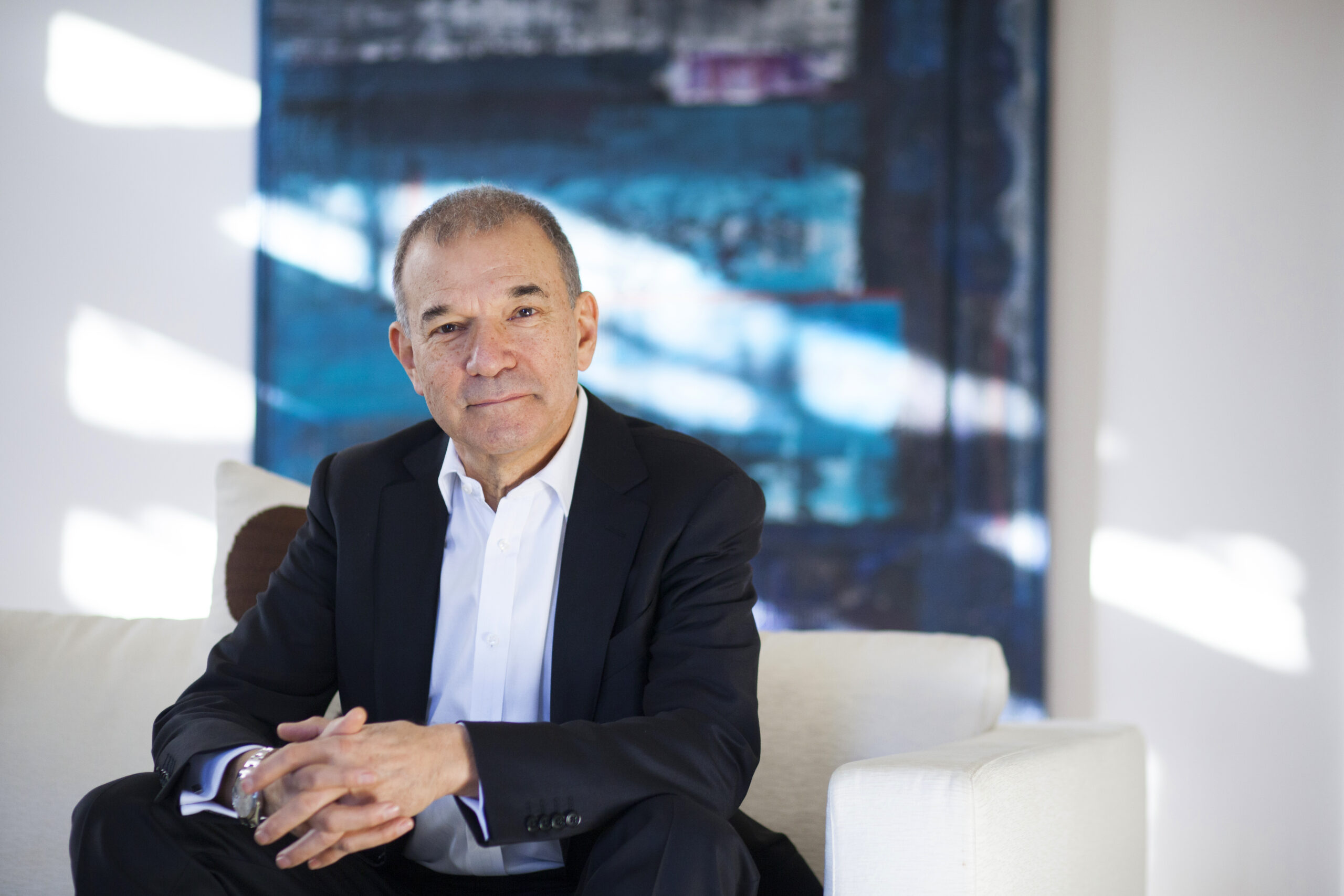
Stephen Greenblatt is the John Cogan University Professor of the Humanities at Harvard University. He is pictured in his home in Cambridge. Stephanie Mitchell/Harvard Staff Photographer
‘So that represented my own little rebellion’
The literary adventures of Stephen Greenblatt
How many scholars of the Renaissance wind up as guests on “The Colbert Report”? It’s safe to say that Harvard literary theorist and critic Stephen Greenblatt is the only one. He used the appearance to trade Shakespearean jabs with the acerbic host, easily holding up his end of the bargain. In real life, Greenblatt — winner of both a Pulitzer Prize and a National Book Award for “The Swerve: How the World Became Modern” — teaches in Harvard’s Department of English.
Along with Shakespeare and early modern literature, his scholarly interests include the way literature intersects with travel, religion, and anthropology. He also teaches literary and cultural theory. During the 1980s, Greenblatt introduced New Historicism, a set of critical practices that welcome the historical and cultural context of a great work into its interpretation.
Though renowned for his scholarship, and celebrated for both his teaching and his public lectures, Greenblatt at his core is a storyteller — a writer who makes the magic of centuries-old literature come alive for modern audiences, both academic and general. Aside from “The Swerve,” his best-known books include “Will in the World: How Shakespeare Became Shakespeare”; “Marvelous Possessions: The Wonder of the New World”; and “Learning to Curse: Essays in Early Modern Culture.” He is also general editor of both “The Norton Anthology of English Literature” and “The Norton Shakespeare.”
Greenblatt, 70, came to Harvard in 1997 after teaching for almost 30 years at the University of California, Berkeley. He is the John Cogan University Professor of the Humanities.
Tell me about your boyhood. What might have put you on your path to being a scholar?
One constant theme in my whole life is a fascination, somewhat compulsive fascination, with the power of stories. Anyone who works on the kinds of things I do must, I imagine, have something of the same compulsion. For me, as for most everyone else, the sense that stories are powerful and important has its origin at home, that is, locally and intimately. In different ways both my mother and father were storytellers — my mother quietly and rather shyly; my father in a much more florid, performative way. When we walked to his law office in Boston, it was very difficult to get up or down State Street in a reasonable amount of time because he would constantly run into people and they would immediately begin to trade stories — this being Boston in the 1950s they were largely ethnic stories, often with punch lines I did not understand.
I grew up with the rhythms of these stories in my ears, and on my mother’s side more intimate stories, made up specially for me, and in which I figured as a character. If I were to ask myself, why have I thought my whole life that stories are an enormously powerful way of conveying things that are most important to a human being, it must be this peculiar inculcation in the family and home.
Were the stories, the stories your mother in particular told, family stories?
Not really. My mother’s stories were meant, looking back, to be mostly monitory tales told about someone named Terrible Stanley who was always getting into trouble by crossing the street to get to the Franklin Park Zoo — until I turned 5 we lived in Roxbury — and failing to look both ways. We’re not talking about “King Lear” here, or about the complexities of a rich family archive. The stories were not even quite about me; they featured a character named Stanley, not Stephen. But I understood that I was implicated in the narrative.
Were your parents in the literary world?
No, no. My father was a lawyer in Boston. My mother was not employed. She was a homemaker, as I believe at that point it would have been called.
Were there other figures in your family who influenced your sense of storytelling?
I was from a very extended family, but somehow this gift was particular to us. It seemed to be the trademark of my nuclear family. I can’t think of anyone else in the immediate orbit who had the particular narrative gifts, or narrative obsessions, of my parents.
So we go at some point from these stories to books, and then from books perhaps to school. Was your household full of books?
No, not at all. There were relatively few books on my parents’ shelves. And my father, even though he was a lawyer, did not go to college. He became a lawyer in the days in which you could go straight to law school from high school. My mother didn’t go to college or university. My older brother, who was four and a half years older, was the first person in my nuclear family to go to college and I was the second.
Ours was not a bookish family, but as was typical of Jews in the mid-twentieth century, my parents deeply respected learning. They admired and looked up to anyone whom they identified as a professor, as if the title itself had a kind of magical power.
When did you become acquainted with the world of books?
If you have relatively few books, then the few you have are quite significant to you. So I had an extremely intense childhood relationship to “A Thousand and One Nights,” that storybook about stories par excellence. We happened to have it in our bookcase. I don’t know why. Then there was a volume called “Richard Halliburton’s Book of Marvels.” Halliburton was a writer of no particular literary distinction, but he possessed a charming exuberance. He traveled around the world and saw exciting things — the Golden Gate Bridge in San Francisco, or the Great Wall of China — and he wrote somewhat breathless accounts of his adventures. I can remember every one of the small number of children’s books we had with great vividness, so I must have read them 5,000 times each.
We had two categories of books on our shelves. We had a relatively small number of the kind I just mentioned. And then we had — also in relatively small numbers — Jewish books. My father owned a complete set of “The Jewish Encyclopedia,” an English-language version of the German “Wissenschaft des Judentums” [“Judaic Studies”]. Huge, heavy, scholarly volumes about the history and practice of Judaism. I have them now in my library at home. When I open the pages, I still find corsages that were pressed in them by my mother many decades ago, like ghosts emerging from the distant past. I think in fact my father bought the set because a very clever salesman told him it would be a way of remembering the dead. There’s an elaborate memorial sheet in the first volume. My father, who had very little money at the time, must have been persuaded that buying such extremely expensive volumes about the history of Judaism would be a good way of honoring his deceased father. I have, in any case, always felt the peculiar relationship between books and the memory of the dead.
Was there a moment in your childhood — at the local library say, or the library in your school — where you were awakened to this vastly larger world of books?
I had the good fortune of going to public school in Newton, which was full of superb teachers, several of whom in particular have stayed in my mind: One English teacher, Sam Granger, whom I had in both seventh and ninth grade, was memorably mercurial, entertaining, and demanding. And then in high school another even more brilliant English teacher, John Harris, made an enormously powerful impression on me and remains for me a model of intellectual integrity. I had very good teachers in college as well, of course, but the teachers who matter to you in the very deepest way are likely those who get you early.
‘For me there are no fundamental intellectual differences between what you tell the initiated — your colleagues and graduate students — and what you tell the uninitiated.’
Along the way here, was there an author or particular book that gave you a passion for great literature?
I don’t know that I can say that. I was no child prodigy. In fact, I encountered “As You Like It” in Miss Gillespie’s eighth-grade class — and it seemed like the worst, most boring thing I ever read in my life. I can still remember the shudder with which I received the words “Sweet my coz, be merry.” I just didn’t get it at all. So it’s not like I awakened as a child to the wonders of Shakespeare.
But I do remember reading “Anna Karenina,” and finding it gripping. This must have been in high school, and I recall the experience with some sense of comedy because when I went for a college interview I said to my parents maybe I would talk about this novel because I loved it so much. And my parents — who, as I say, hadn’t gone to college — told me, “Oh, don’t do that. They’re not interested in that. Talk about sports. That will show them that you’re a regular fellow.” So I kept trying to bring the conversation back to Ted Williams.
I recall too with great intensity an early reading experience that had nothing to do with imaginative literature. I read Nietzsche’s “Genealogy of Morals” — I do not know where I would have come across it — and I was unbelievably disturbed by it. I can only think of the French word, bouleversé, turned upside down. … it still seems to me an astonishing work, marvelous and hateful at the same time, brilliant and horrible. Even now, so many years later, I can actually channel the feeling, as it were, of getting hit by its intellectual and rhetorical violence.
That junior high school experience with Shakespeare. Was that your first?
It must have been my first. Why a junior high school teacher would have chosen “As You Like It,” that most sophisticated of pastoral comedies, to inflict on pubescent boys — or girls — is beyond me.
What would you have chosen?
That’s a good question. Hmmm. The traditional choice would have been “Julius Caesar,” which I think is certainly better than “As You Like It,” though still very difficult to come to grips with imaginatively. Maybe “Macbeth,” maybe “Romeo and Juliet.”
How about “The Tempest”?
Perhaps. In any case, these were the days before a teacher could show videos. It would have made a huge difference to give students an idea of what it could possibly sound or look like. I remember feeling completely baffled by the opacity of the language. If I had seen the wrestling match at the start of “As You Like It” I might well have gotten it.
But — not to belabor Shakespeare — at what moment was he reclaimed in your imagination?
Not so long afterwards, in what must have been my senior year in high school, my gifted teacher, John Harris, centered a whole semester on a single work, “King Lear.” At a certain point he said he didn’t understand something quite crucial in the play. I had never heard a teacher saying he didn’t understand anything about anything and that made a very deep impression on me. The license to recognize that something is eluding you, and that you’re forced to grapple with it — not to take flight, but to wrestle with the angel — seemed to me crucial. From that moment on — though I did not decide I was going to be an English professor — I saw that there was something for me.
Was there a moment along the way where you decided: This is what I am going to do. Or were there temptations to be a lawyer, or …
Yeah. I was attracted to graduate school in English, but I thought I was going to be a lawyer. My brother always knew he was going to be a lawyer — and he did become a lawyer, and had a practice with my father. Though I was drawn to literary study, I assumed that I would eventually join them. In my senior year of college, though looking back it seems a bit strange, I applied to a single law school — Yale — and I also applied to a raft of fellowships to study abroad. So I basically figured I would be a lawyer, but I would defer entering law school if I had a chance to go overseas. I had never been out of the country.
I was admitted to Yale Law School and turned down for the first six of the seven fellowships that I applied for. So it looked like the die was cast for law. But the little ball went around the roulette wheel and happened to land on the last spot. I got a Fulbright to England.
I deferred my entrance to law school — Yale very kindly agreed — and then I went off to Cambridge to do English. I was still obsessing about graduate school, and I bored all my friends and myself silly wondering what I should do. In the fall of my first year in England, I applied for a renewal of my Fulbright and a renewal of my admission to law school. On the long Christmas vacation, I found myself in Istanbul, where someone forwarded to me my mail and I learned that both renewals had been granted.
I remember holding the two letters in my hand. And for reasons I still cannot fully explain — partly because I had just turned 21, partly because I was in Istanbul, and I was standing on the Galata Bridge — I impulsively tore up the letter from Yale, threw it into the Bosporus and decided to stay in Cambridge. I knew that if I wasn’t going to go to law school the next fall I wasn’t going to go, period. I was going to go to graduate school.
So you spent two years at Cambridge.
Right. Then I entered the Ph.D. program in English at Yale in the fall of 1966.
Had there been many influences in your undergraduate years at Yale that got you to graduate school there?
I had a great time at Yale. My undergraduate thesis, such as it was, was published as a book by the Yale University Press. So I had, at least in this slightly comical form, lost my virginity as a writer of academic books.
What book was that?
A book called “Three Modern Satirists,” about Evelyn Waugh, Aldous Huxley, and George Orwell. Funny even to think about it.
Were there deep, John Harris-style influences at Yale?
Yes, there was one remarkable person — still alive — who was quite important to me, both as an undergraduate and then subsequently as a graduate student: Alvin Kernan, a first-rate Renaissance scholar who wrote extremely vigorous prose and who was to me an interesting, slightly exotic, figure. He came from — I can’t remember any longer — Wyoming or Montana and had been on an aircraft carrier in the Battle of Midway in World War II. In his retirement he wrote several quite good books about his days in the war.
So there’s him.
And then I had an array of remarkable teachers — Robert Penn Warren and Cleanth Brooks, and Maynard Mack: the giants before the flood. Yale has always run a good English department and it had a great one in those days. It would be difficult to reproduce in any university today the feeling of this moment in the 1960s where literary study seemed to be the absolute beating heart of intellectual life, the most exciting thing that was going on.
I’m somewhat resistant to the hand-wringing about the present so-called crisis in the humanities. There are other competing intellectual interests and I think on the whole that is a good thing. But I don’t regret that I experienced for myself that period — which continued all through the 1970s — when English seemed unbelievably energized and exciting.
Forgive me one slight swerve: But — Robert Penn Warren!
He was fabulous. I had a very small class with him. There must have been only eight or 10 students — Yale was all-male at that point. We sat around and read Faulkner and Fitzgerald and Hemingway and he talked about how the books were put together, and how the sentences worked. I found it thrilling. I didn’t know him as a poet at that point. I knew him as the author of “All the King’s Men,” but also as this remarkable teacher.
What about the Cambridge moment earlier, the two years you spent there. Were there big influences there?
It sped me on my way. From an intellectual point of view, maybe most of all, there was Raymond Williams, who was the leading English Marxist literary critic at the time. I had never encountered a real live Marxist, let alone someone who combined Marxism with literary criticism and an aura of sturdy, working-class authenticity. It was a very important moment for me that led into the political ferment of the late ’60s and ’70s.
I would also go to tutorials with F.R. Leavis, a legendary figure, who was then a kind of anti-Christ at Cambridge, having been expelled from the department. He had fought with everyone but he would have seminars in his own house and I would go quite regularly.
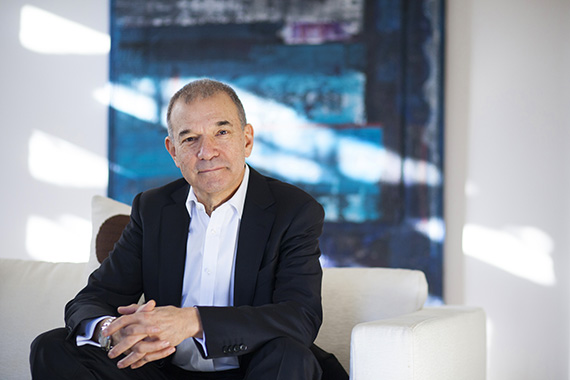
Greenblatt, pictured at his Cambridge home, remembers an early engagement with “Othello” as crucial to his development as a teacher and a writer.
Harvard University
Thinking back to that moment in Istanbul: The setting had something to do with your decision. Was there something analogous about the setting in Cambridge, this seat of great, ancient learning, at least by American standards?
By almost any standards, Cambridge is ancient. But I knew almost nothing about the place before I went there. In those days as a Fulbright you could more or less name what college you wanted to go to. I said that I wanted to go to Pembroke College, and for two reasons. One, the undergraduate thesis I wrote was on modern satire, and at Pembroke there was a man named Matthew Hodgart, who had written an important book on the subject and who could, I thought, be my tutor. And second, Pembroke was the Renaissance poet Edmund Spenser’s college, and I thought that would be cool.
When I got there I discovered that Hodgart had left. And yes, there was an old portrait of Spenser on the wall, but I could have had more informed ways of choosing a college than that. Yet in the end it turned out to make a difference: My decision to work on the Renaissance, rather than on contemporary literature, had something to do with the fact that Pembroke College, as I had not fully grasped, had a very strong stamp from the English Reformation. And then one of the “papers,” as they called them in the big Cambridge exam, was on the period from 1569 to 1603. In the course of immersing myself in that brief period, I read the poetry of Sir Walter Ralegh, which amazed me — really amazed me. I couldn’t understand how someone in the 1590s had written poetry that sounded to me uncannily like T.S. Eliot.
When I came home and entered graduate school at Yale, I chose to do my dissertation on Ralegh. I wanted to discover what it was in this man’s life that made him produce such strange poetry. And it turned out that Ralegh had an astonishing life. He was a courtier and a monopolist and an explorer and an adventurer and a scoundrel and a troublemaker. He wound up spending years in the Tower of London and eventually ended up getting his head chopped off.
Once I began to understand something about Ralegh’s career, the question with which I had begun turned itself inside out. I wanted to know how someone who had led such a life had written poetry at all. It didn’t make sense. What was someone who was scrambling at court to get the monopoly on playing cards or exploring Guiana doing writing poetry?
At the time, Yale was the beating heart of New Criticism, which meant you precisely didn’t interest yourself in the historical world that poetry comes from. You focus on the formal aspects of the work, about which you could say very interesting things. You learned certain techniques of literary analysis, and you left for historians, or for middlebrow people, the concern for what it meant to be a courtier or an adventurer.
And so my own small rebellion — my form of biting the hands of those who fed me — was to be interested in those things that were meant to be ignored. Partly, as I say, I had already had this experience with Raymond Williams — learning what Marxists were saying about art’s relation to life. And so I thought: All right, that’s what I want to do. Virtually all the work that I’ve done in the subsequent decades came out of that determination: to put the work of art back into the life-world from which it came and to understand its effects upon the very different life-world it may enter, often centuries later.
And we all love you for that.
Though I was impatient and often bored with it at the time, I don’t at all regret the rigorous formalist training I received. On the contrary, I use it all the time as a way of both counterbalancing and enhancing my cultural, anthropological, and historical interests. And I think my generation to some extent failed to transmit adequately to the next generation the toolkit that we had been given.
At a certain moment in — it must have been ’68 — I remember coming out in the hallway, and buttonholing a friend of mine, and saying: “I’ve written the first sentence of my thesis.” He asked, “What is it?” And I said, it’s “Sir Henry Yelverton, the king’s attorney general, was no friend to Sir Walter Ralegh.”
My friend looked baffled. I said, “Don’t you see, you can’t tell whether it’s coming from a novel, a history, a short story, or — in this case — my dissertation.” So that represented my own little rebellion.
So it’s fair to say then that you embraced this approach to literature very early on, right within your graduate days. And at the same time appreciated the formality of your literary training.
Yes. It’s hardly a great sentence, but it is possible to glimpse two things in it. One is a refusal to accept, comfortably, the genre of academic writing, a refusal that has served me in extremely good stead. And the other is an interest in the historical situation of the writer, in this case, who was or was not Ralegh’s friend.
That was back in 1968. I did not suddenly wake up a few years ago and think it would be worth trying to write literary criticism for more than a handful of people assigned to read it. I’ve always been interested in that possibility: to write sentences that don’t erect a barrier between scholarship and the common reader.
You embraced writing that has clarity.
God knows I’ve written plenty of opaque sentences. But I think the key point, and it’s true for my teaching as well, is that for me there are no fundamental intellectual differences between what you tell the initiated — your colleagues and graduate students — and what you tell the uninitiated. You have to explain allusions to those who do not know them. You can’t be willfully or needlessly obscure. But the complexity or difficulty of the thought is whatever is required, as it were, by the subject and by your own vision.
I don’t have many regrets as a writer. With a particular book of mine, called “Hamlet in Purgatory,” I almost could see my way clear to figuring out how to make what I had to say accessible to a much larger group of people than I reached. The issues involved in “Hamlet in Purgatory” are genuinely powerful ones having to do with the change in the fundamental relationship between the living and the dead. But to my regret, the best way to convey them to a broad public eluded me. In recent years I’ve managed to improve. But from the Ralegh book on I’ve always been interested in that possibility.
What about your relationship to Shakespeare? When did he come into your life fully as an academic?
Probably in the book that I wrote immediately after the Ralegh book. It was called “Renaissance Self-Fashioning,” in which Shakespeare appeared in only one of six chapters. But that chapter, on “Othello,” released a tremendous amount of energy in me. I was able to burrow deep into sixteenth- and early seventeenth-century colonial encounters, theological debates, racial tensions, and sexual anxieties as ways into “Othello.” And I was able at the same time to write something about the actual moment in which I was living, a moment when Berkeley, where I was teaching, was wild, with tear gas and police raids and anti-war protests, secret meetings to reconstitute the university, racial struggles, sexual experiments, and God only knows what else.
I felt I had succeeded in doing something that I had not been able to do until this point — to merge my historical and literary interests in the past with the full force of my engagement in the present. Not thinking of them as separate enterprises but thinking of them as the same enterprise. And for me as a teacher, as a writer, as an intellectual, as a lover of literature, as a lover of Shakespeare, that was the goal.
The lover of Shakespeare part is not accidental. It was with Shakespeare more than with any of the other figures I had studied that that strange touching together of the wires of the past and the immediate present was possible. That’s what Shakespeare enables as an artist. He grasped what he would have to do for his art to survive. It would have to be sufficiently malleable. It would have to have its roots in the deepest possible way in his world. But it would have to be able to reach out and make itself available to other worlds, including the world of crazy Berkeley in the 1970s.
Whatever was good in this book depended on refusing to choose between the past and the present — on making use of every ounce of my energy, passion, conviction, fear, and rage in the present in order to plunge into the past. And likewise, of somehow making use of the past to clarify my relation to the present.
Shakespeare has served that way all my life. There’s a certain amount of antiquarian heavy lifting you have to do to be a player in Shakespeare scholarship. But something about Shakespeare’s art is — and I’m not a mystic — very strangely suited to a mystic marriage of the past and the present.
That’s a perfect place to end.
Good!
Interview was edited for clarity and length.
